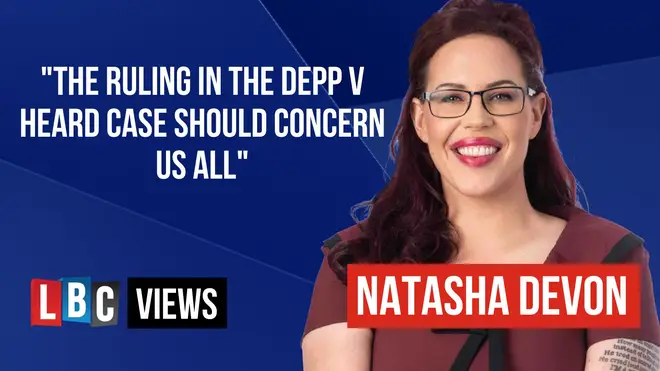
Ben Kentish 7am - 10am
8 June 2022, 13:23 | Updated: 10 June 2022, 12:03

I will receive weeks of online abuse for writing this post, just as I have every time I have spoken about it on LBC.
Just as those women brave enough to publicly speak out against the prevailing narrative, such as Barrister Dr Charlotte Proudman and journalist Martha Gill have done (I’ve had dozens more conversations with women who share our views but, understandably, don’t want to invite a vicious, misogynistic pile-on into their mentions).
Yet the voracity of the backlash, not just against the notion that Amber Heard might have been failed by the justice system, but against the entire #MeToo movement which her and Johnny Depp’s relationship, somewhat inexplicably (but undoubtedly by design) has come to represent, merely illustrates the scope of the work there is still to do.
The jury found Depp’s talent agent had libelled Heard when they accused her of staging a ‘hoax’ scene of abuse at their home, to which the police were called.
They also found that Heard defamed Depp when she described herself as ‘a public figure representing domestic abuse’ in an article for the Washington Post.
Yet, as anyone who has either experienced domestic abuse or worked with those who have knows, survivors are often confused as a result of the impact being coercively controlled and gaslit can have on your mental clarity.
They often behave in ways they aren’t proud of (sometimes in self-defence).
They very rarely have concrete proof of what has happened, particularly if the abuse they have experienced is psychological.
The way Heard has been pilloried and ridiculed by right wing press and on socials demonstrates the extent to which, however much it might appear feminism has come on in leaps and bounds during the past decade, we still very much have the capacity to conduct a witch hunt.
We still expect women to be ‘perfect’ if we are to believe that they deserve justice. And that is what makes this issue gendered.
Of course, men experience domestic abuse, rape and sexual assault too (although not in such large percentages, as #MeToo campaign highlighted, women without experience of at least one of these are incredibly, almost vanishingly, rare).
Those who claim to show any empathy towards Heard is to deny the existence of male victims do so less, I suspect, out of a real concern for the male survivors of domestic abuse and more to derail conversations about how to protect women, who make up 73% of cases according to the Office for National Statistics.
Yet the irony is that their response to Depp in itself demonstrates the inequality at play: Men, unlike women, don’t have to be perfect in order to be believed.
In 2020, Depp tried to sue The Sun newspaper after they described him as a ‘wife beater’ and lost (in a UK court, where thresholds for bringing a libel case are much lower than in the US).
The ruling found that Depp had, on the lower civil standard of proof, assaulted Heard in 12 of the 14 alleged incidents and had put her in fear of her life.
And yet, this knowledge doesn’t prevent numerous commentators from believing his version of events.
Men can be problematic, complex or badly behaved, yet they will usually be viewed through a sympathetic, or at the very least a three-dimensional, lens.
Their truth will be believed until disproven. Women, conversely, will have their every misdemeanour, every questionable action, even every sartorial choice scrutinised and are more likely to be instinctually disbelieved unless they can produce a dossier of water-tight evidence.
That’s what people misunderstand when they hear the phrase ‘believe women’. It doesn’t mean ‘automatically believe all women regardless of what they say’. It means ‘don’t work from the assumption that women are lying’.
Essentially, it means we should give women the same respect we routinely afford men. Regardless of what the papers might say, #MeToo can’t be over until this becomes reality.